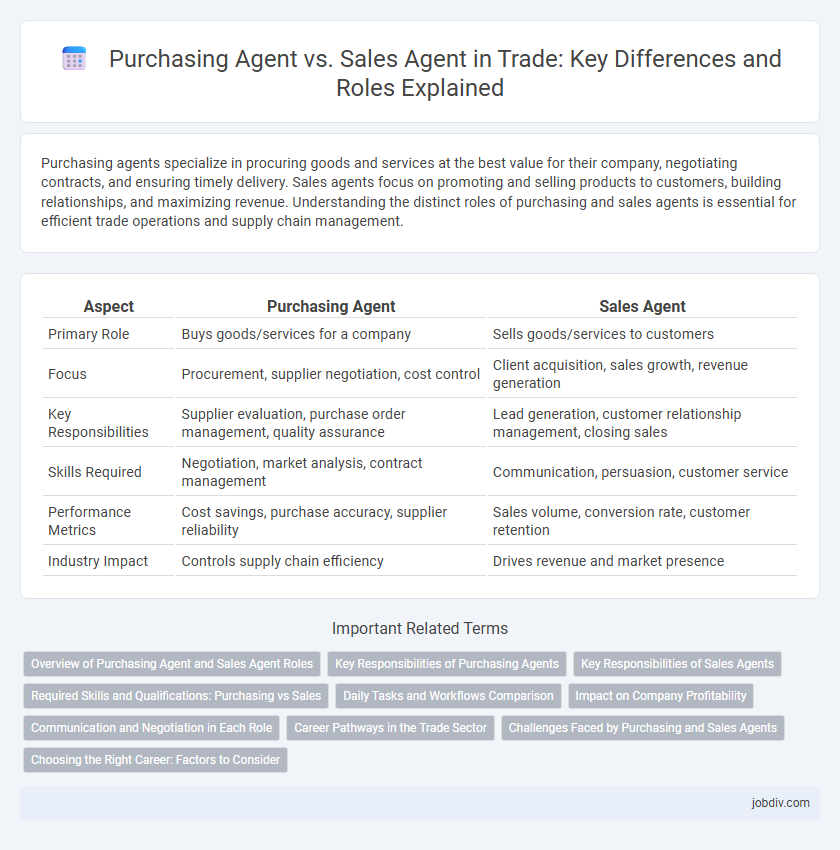Purchasing agents specialize in procuring goods and services at the best value for their company, negotiating contracts, and ensuring timely delivery. Sales agents focus on promoting and selling products to customers, building relationships, and maximizing revenue. Understanding the distinct roles of purchasing and sales agents is essential for efficient trade operations and supply chain management.
Table of Comparison
| Aspect | Purchasing Agent | Sales Agent |
|---|---|---|
| Primary Role | Buys goods/services for a company | Sells goods/services to customers |
| Focus | Procurement, supplier negotiation, cost control | Client acquisition, sales growth, revenue generation |
| Key Responsibilities | Supplier evaluation, purchase order management, quality assurance | Lead generation, customer relationship management, closing sales |
| Skills Required | Negotiation, market analysis, contract management | Communication, persuasion, customer service |
| Performance Metrics | Cost savings, purchase accuracy, supplier reliability | Sales volume, conversion rate, customer retention |
| Industry Impact | Controls supply chain efficiency | Drives revenue and market presence |
Overview of Purchasing Agent and Sales Agent Roles
Purchasing agents manage procurement processes by sourcing suppliers, negotiating contracts, and ensuring timely delivery of goods to meet organizational needs. Sales agents focus on promoting products, establishing client relationships, and closing deals to drive revenue growth for companies. Both roles require strong negotiation skills but differ in their primary objectives--purchasing agents aim to optimize cost and supply chain efficiency, while sales agents prioritize market expansion and customer acquisition.
Key Responsibilities of Purchasing Agents
Purchasing agents manage supplier relations, negotiate contracts, and ensure the timely procurement of goods and services to meet company requirements, optimizing cost and quality. They analyze market trends, evaluate vendor performance, and maintain inventory levels to support operational efficiency. Their responsibilities also include assessing purchase orders, monitoring delivery schedules, and ensuring compliance with company policies and industry regulations.
Key Responsibilities of Sales Agents
Sales agents primarily focus on representing sellers to promote and sell products or services directly to buyers, negotiating prices, terms, and contracts to maximize sales revenue. They build and maintain client relationships, identify new market opportunities, and provide product expertise to drive demand and customer satisfaction. Sales agents also gather market intelligence and feedback to help companies adapt strategies and improve competitive positioning.
Required Skills and Qualifications: Purchasing vs Sales
Purchasing agents require strong negotiation skills, analytical thinking, and a deep understanding of supply chain management to source cost-effective materials while ensuring quality standards. Sales agents must excel in communication, customer relationship management, and market knowledge to effectively promote products and close deals. Both roles benefit from proficiency in contract law and data analysis but emphasize different focus areas tailored to procurement or sales objectives.
Daily Tasks and Workflows Comparison
Purchasing agents focus on sourcing products, negotiating with suppliers, and managing purchase orders to ensure timely delivery and optimal costs. Sales agents concentrate on client prospecting, presenting products, and closing sales to meet revenue targets while maintaining customer relationships. Both roles require constant communication and coordination, but purchasing agents prioritize supply chain logistics, whereas sales agents drive market expansion and customer engagement.
Impact on Company Profitability
Purchasing agents directly influence company profitability by negotiating lower costs and securing favorable supplier terms, reducing operational expenses and improving margins. Sales agents drive revenue growth through market expansion and customer acquisition, impacting top-line performance and overall profit potential. Efficient coordination between purchasing and sales agents enhances cash flow management and optimizes profit margins across the supply chain.
Communication and Negotiation in Each Role
Purchasing agents prioritize clear communication and strategic negotiation to secure favorable terms and quality goods from suppliers, emphasizing cost control and delivery timelines. Sales agents excel in persuasive communication and deal-closing negotiation to maximize revenue and build long-term client relationships, focusing on product value and customer satisfaction. Both roles require tailored negotiation techniques to align with their distinct objectives in the supply chain.
Career Pathways in the Trade Sector
Purchasing agents in the trade sector focus on sourcing products, negotiating prices, and managing supplier relationships, often progressing into senior procurement or supply chain management roles. Sales agents specialize in client acquisition, sales strategy, and market analysis, with career advancements leading to sales management or business development director positions. Both pathways require strong negotiation skills, market knowledge, and the ability to build professional networks within the trade industry.
Challenges Faced by Purchasing and Sales Agents
Purchasing agents often face challenges such as supplier reliability issues, fluctuating market prices, and complex negotiation demands that impact cost efficiency and supply chain stability. Sales agents encounter obstacles including meeting diverse client expectations, adapting to competitive market dynamics, and managing long sales cycles while maintaining customer relationships. Both roles require strong communication skills and adaptability to navigate regulatory compliance and evolving trade policies effectively.
Choosing the Right Career: Factors to Consider
Choosing between a purchasing agent and a sales agent career requires evaluating key factors such as job responsibilities, skill sets, and industry demand. Purchasing agents focus on sourcing and negotiating supplier contracts to optimize procurement costs, while sales agents drive revenue by managing client relationships and closing deals. Consider personal strengths in negotiation, market knowledge, and career growth opportunities in sectors like manufacturing or retail to make an informed decision.
Purchasing Agent vs Sales Agent Infographic

 jobdiv.com
jobdiv.com